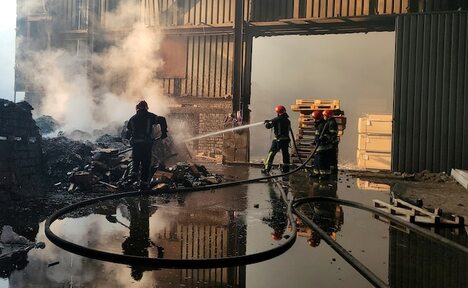On the global food supply – Anshel Pfeffer in Haaretz:
‘Barely 12 hours passed after the signing of an agreement to allow the export of grain from Ukraine – which UN Secretary-General António Guterres called a beacon of hope on the Black Sea – until Russia attacked Odesa port with cruise missiles on Saturday morning.
Russia’s first response was to deny the attack, despite footage showing Kalibr missiles hitting the port (four missiles were fired, two of which were intercepted by Ukraine’s air defense systems). Then, 24 hours later, it claimed it had been firing at “military infrastructure,” which isn’t covered in the agreement.’
(…)
‘The naval blockade of Ukraine, which has been occurring since the Russian invasion began in February, as well as the closure of Ukrainian airspace, is Russia’s only truly strategic achievement in all this time. The ground advances toward Ukraine’s main cities – Kyiv, Kharkiv and Odesa – have all been blocked. The Russians had some tactical gains, such as completing their control over the Luhansk region (which they already half-occupied back in 2014). But in the Donetsk region, their advance has bogged down and, further south, the Ukrainian counteroffensive is pushing them back in the Kherson region.
The Russians have largely failed at sea as well – despite the Ukrainian navy not having any warships. Ukraine’s coastal defense batteries succeeded in foiling attempted seaborne landings on Odesa’s beaches, while their missiles forced the Black Sea Fleet to operate far from the coast, especially after the sinking of flagship cruiser Moskva in April. Ukraine’s drones and missiles also forced the Russians to leave Snake Island, allowing the smaller ports to the west to resume operations.
Yet despite their naval failures, the Russians have still managed to blockade the main Black Sea ports and destroyed and captured Mariupol and the rest of the Sea of Azov. Without these outlets, Ukraine can export only a fraction of the 22 million tons of grain that have been piling up since the war began.’
(…)
‘Turkish President Recep Tayyip Erdogan, who met Russian President Vladimir Putin in Tehran last week, also played a major role here. Turkey has become a major hub for Russian trade, allowing it to partially bypass sanctions, and it will gain even more by becoming the way station for Ukrainian grain. Putin doesn’t want to anger Erdogan too much. They both have much to lose.
Putin, however, doesn’t want anyone thinking he’s relinquishing control of the Black Sea. The missiles fired on Odesa were a reminder that even if the Istanbul agreement is implemented, he can stop the ships crossing at any time. This isn’t just a threat on the global food supply chain; it’s an indication of what he is prepared to do to natural gas supplies to Europe in a few months’ time, come winter.’
(…)
‘Putin is prepared to gamble in the expectation that the Western nations won’t jeopardize the Istanbul agreement by sending Ukraine more game-changing weapons. He knows the West has no other solution for exporting the grain.
There is, of course, a much better way to do so. The West could form a naval task force that could secure the Black Sea trading routes. NATO’s navies, which include Turkey, could easily muster a force far superior to the one Russia has there. But they are still determined to avoid any possibility of a direct military clash with Russia.’
Read the article here.
Turkey is in this conflict what Pakistan was in the Afghanistan-war, an ally of the West and an ally of the enemies of the West. Nothing new, Turkey played the same in the war in Syria.
The end game or at least the pre-end game becomes visible, blackmail the West with food supply and gas, bet on the wish of Biden and the European leaders to avoid any direct confrontation and see how far you can push your enemies in a corner.
